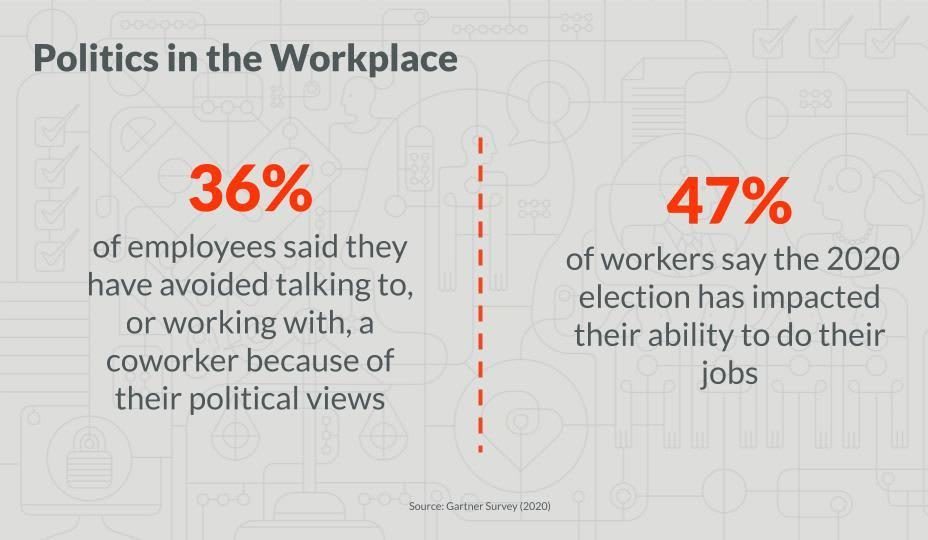Over the past several years, conversations about politics in the workplace have shifted from taboo to commonplace. Mixing politics and work, however, can pose both challenges and opportunities when creating positive, productive workplaces that are inclusive to all.
The nation’s political divide is certainly impacting the world of work. A recent Gartner survey showed that 36% of employees have said they avoid talking to, or working with, colleagues who differ in political views. The same survey showed that 47% of workers said that the election has impacted their ability to do their jobs. This is because they’re consumed with media or conversations about politics or the mental stress about the political ecosystem is distracting them from the task at hand, which is decreasing productivity. What’s alarming is that these results were from February 2020; the impacts of a post-pandemic world have surely deepened these sentiments.

Progressive organizations are considering how to best prepare for the effects of an election cycle while maintaining employee engagement and productivity, regardless of employees’ political views.
Here are 9 strategies to consider during election week, as well as in the months ahead, to help your organization navigate possible impacts of elections, regardless of their outcomes. These can be adapted to your own culture and work environment, and can be used whether your employees are working remotely, in-person, or a combination of both. Implementing just a few of these ideas can help teams find balance in their work life and in the changing world around them, particularly in an era filled with significant unknowns.
- Consider a proactive (but neutral) communication from leadership.
- Equip managers for a range of employee responses.
- Set expectations for respectful workplace interactions.
- Provide a forum for employee discussions.
- Remind employees about your social media policy.
- Revisit your daily news feeds.
- Ensure that your workforce is properly trained.
- Reassure your employees about your company’s plans.
- Expect a continued focus on ESG.
5 Tips for Navigating Election Week
1. Consider a proactive (but neutral) communication from leadership.
When major events occur outside of work, employees often want to hear from their leaders to provide assurance, a sense of stability, or even just address the “elephant in the room.” Thus, it may be helpful for a senior leader to proactively acknowledge the heightened energy and emotions that often surround a national election, while keeping the message inclusive to all by focusing on the importance of voting in general. As such, many organizations have considered offering employees the day off on election day as a way to recognize and celebrate their civic duty.
2. Equip managers for a range of employee responses.
It’s likely that some employees will be jubilant and some will be grieving post-election. Those who are celebrating may cause others to feel excluded or annoyed; those who are unhappy may express anger or frustration toward those celebrating; and everyone’s productivity and focus may drop, distracted by post-election energy. Counsel your managers on how to prevent these expressions from escalating into a hostile working environment or the exclusion of colleagues. Provide them with guidance for supporting employees who want to talk privately, addressing behaviors that cross the line, and coaching when sustained dips in performance or engagement are observed.
3. Set expectations for respectful workplace interactions.
Related to the above, reiterate to all employees your organization’s expectations around maintaining professionalism, civility, and respect at work. One strategy is to highlight that political views are one element of employee diversity, and remind employees of your organization’s collective commitment to inclusion and respectful treatment of all employees.
4. Provide a forum for employee discussions.
Some organizations are looking to channel post-election energy in a constructive, inclusive way by facilitating employee conversations. Similar to discussions about racism or social justice that many organizations hosted earlier in 2020, these guided conversations can be led by employee resource groups (ERGs) or others, with ground rules communicated in advance so employees feel comfortable sharing their thoughts and feelings.
5. Remind employees about your social media policy.
If employees’ online posts about a candidate, the election outcome, or other political issues could run afoul of your organization’s social media policy in any way, recirculate the policy to all employees before the election.
4 Tips for Post-Election Planning
The impact of the election results will last beyond commentary in news feeds. While the scope and nature of any effects are yet to be determined, here are some things you can do to prepare now to continue your work to create an equitable, positive workplace regardless of the outcome.
6. Revisit your daily news feeds.
Keep a pulse on public policy changes that could impact workplace policies, procedures, and benefits by refreshing the information sources you regularly access. By staying updated and sharing information or recommendations with colleagues, you position yourself as a strategic advisor to other organizational leaders and can anticipate any necessary adjustments.
7. Ensure that your workforce is properly trained.
Having healthy and respectful conversations across differences (political or otherwise) is a skill that needs to be continuously built and practiced. Provide dedicated opportunities to reinforce workplace culture norms of respect, inclusion, and valuing difference. Ensure you are meeting compliance training deadlines for topics such as harassment prevention and code of conduct.
8. Reassure your employees about your company’s plans.
Many political candidates have articulated their positions on various issues that may impact the workplace. Your employees may wonder how the outcome of the election will affect your company’s policies or benefits longer term. If, for example, your organization has a practice of going beyond federal law in a particular area, you can share those plans with employees. This reassurance can provide your employees with a sense of stability and continuity in a time of change.
9. Expect a continued focus on ESG.
Many employees continue to expect their employers to take action on issues that matter to them, both internally and externally in communities they serve. With leading indicators like the Business Roundtable’s decision to redefine the purpose of the corporation and workforce expectations that organizations be a part of addressing societal issues, we can assume that the focus on Environmental, Social, and Governance (ESG) efforts will extend beyond the results of the election and that organizations will continue to align their internal and external community engagement efforts with company values.
The upcoming election, and its aftereffects, provide both a challenge and an opportunity to amplify a healthy workplace culture of respect, inclusion, and collaboration. Being intentional and proactive in a few ways will help your workforce to navigate through and beyond election week.

